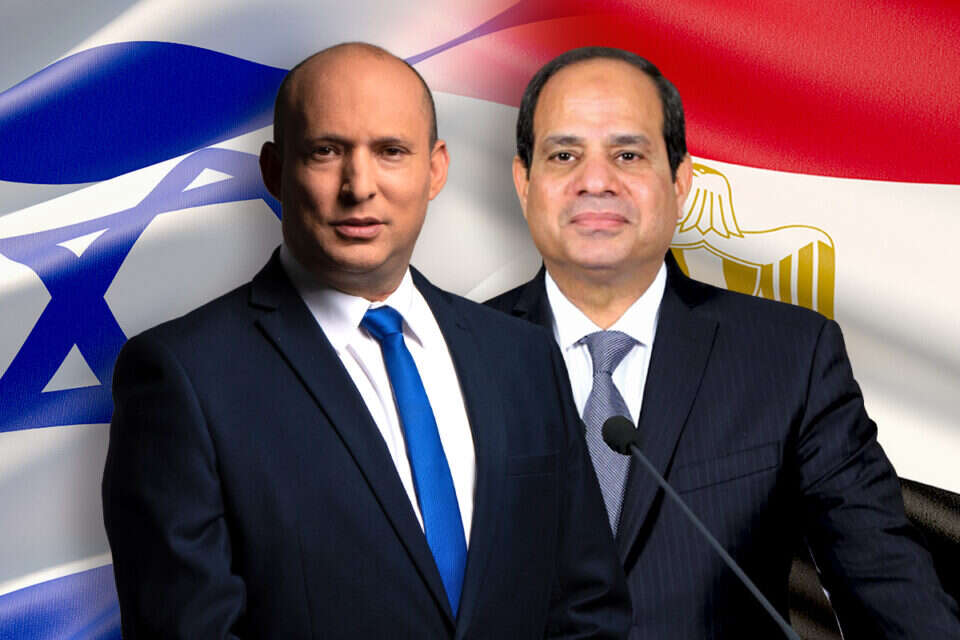Egyptian President Abdel Fattah al-Sisi will meet today (Monday) with Israeli Prime Minister Naftali Bennett in Sharm el-Sheikh.
This meeting takes place after the Israeli Prime Minister's last visit with his Egyptian counterpart was about a decade ago by Bennett's predecessor, Benjamin Netanyahu. The visit shows that the Egyptian government is seeking to create a positive atmosphere between the countries The local audience in relation to Israel.
Egypt was the first Arab country to break the taboo on relations with Israel when it signed the peace agreement in March 1979. Over the years, Egypt has not implemented all the normalization clauses in the peace agreement while maintaining a "cold peace."
Its leaders made it difficult for Egyptian citizens to maintain ties with Israelis;
Egypt has hardly changed the curriculum in the education system towards Israel that even included antisemitic motifs and the government-controlled media continued to be hostile.
Although it is possible to note the limited cooperation in the fields of water and agriculture and Israeli tourists were welcomed for some time in Egypt, especially in the first years of peace in the 1980s, most of the bilateral ties were conducted through security and military channels.
The countries are allies against Turkey's Islamic and neo - Ottoman aspirations
The Egyptian breakthrough towards Israel marked the limitations of Israel's relations with its Arab neighbors.
This agreement largely paved the way for a peace agreement with the Kingdom of Jordan in October 1994, but Jordan also largely adopted the Egyptian pattern in relation to Israel.
In contrast, the Abrahamic Agreements, in 2020, were in fact a dramatic change and are characterized by close ties - economic, cultural and commercial - especially between the United Arab Emirates and Israel.
The normalization agreement signed in December 2020 with Morocco also marks a turning point in relation to the Jewish state in the region.
The hustle and bustle surrounding the Abrahamic Accords, which we are currently marking a year to sign, as well as the fact that Israel has a new government, have apparently eased the Egyptian president by inviting Bennett to a meeting.
While diplomatic development is welcome, it most of all emphasizes the common strategic interests between the countries in light of the threats to the two countries.
The Egyptian shift toward Israel stemmed primarily from President Anwar Sadat's understanding that Egypt needed a drastic change in its foreign policy - the adoption of a pro-American orientation and the relinquishment of reliance on the Soviet Union - and at the same time the fatigue from the conflict with Israel.
Following the peace agreement, Egypt began receiving $ 1.3 billion a year in American aid, which played an important role in Egypt's economic and military development.
This assistance is linked to assistance to Israel.
Israel is helping Egypt in Washington continue to accept its faction while trying to divert American criticism of human rights violations.
Although Egypt is also trying to diversify its sources of military procurement, Jerusalem has a clear interest in continuing American influence in Cairo.
Jerusalem and Cairo are following with concern the strengthening of Iran
The two countries share an opinion on developments in the region and in other parts of the world. Concerns about the American withdrawal in Afghanistan and the loosening of the American grip on the Middle East are common to both countries amid threats from extremist Islamic terrorists. At the regional level, Jerusalem and Cairo are following with concern the strengthening of Iran's influence in the region, although Egypt's perception of the threat is less than that of Israel. However, there is no dispute between them about President Erdogan's Turkish aggression in the eastern Mediterranean (with the support of Qatar). They are allies against Turkey's Islamic and neo - Ottoman aspirations. Egypt, it is important to note, is a key member of the strategic set-up embodied in the Eastern Gas Forum of the Mediterranean (EMGF) together with Greece and Cyprus designed, among other things, to prevent the realization of Turkish hegemony.
At the same time, Egypt is facing an uprising of ISIS-led Islamic terrorists in the Sinai Peninsula, where Israel is a partner in intelligence and military efforts to contain it. Hamas, which has aided the Islamists in Sinai, is of course challenging Israel as well. In Gaza.
In North Africa, too, Egypt and Israel have common interests.
Both sides support (not equally) Marshal Khalifa Heter, commander of Tobruk's Libyan National Army, in the Civil War, with the help of Israel's new partner, the United Arab Emirates.
On the other hand, Turkey intervened in 2020 to prevent the fall of the national consensus government in Tripoli, which includes extremist Islamic elements.
Even in the Syrian arena Israel and Egypt have the same preferences.
Egypt has opposed efforts by Sunni rebel groups to oust Bashar al-Assad, while Israel has been careful not to undermine its regime's stability in order to maintain its freedom of action against Iranian targets while maintaining agreements with Moscow following Russian intervention that began in September 2015.
The Egyptians tend to call their country "Umm al-Dunya" (mother of the world) and thus express the self-importance in which they perceive themselves.
However, Egypt's regional weight has declined since Nasser's days and Egypt's focus of attention is mostly local, like most Arab countries.
At the same time, Egypt is the most populous and important country in the Arab world and has the most powerful army among Israel's neighbors.
Therefore, Egypt is an important strategic partner for Israel, which deserves high priority on Israel's foreign policy agenda.
Hopefully the Bennett government understands this.
Prof. Ephraim Inbar is President of the Jerusalem Institute for Strategy and Security (JISS)

